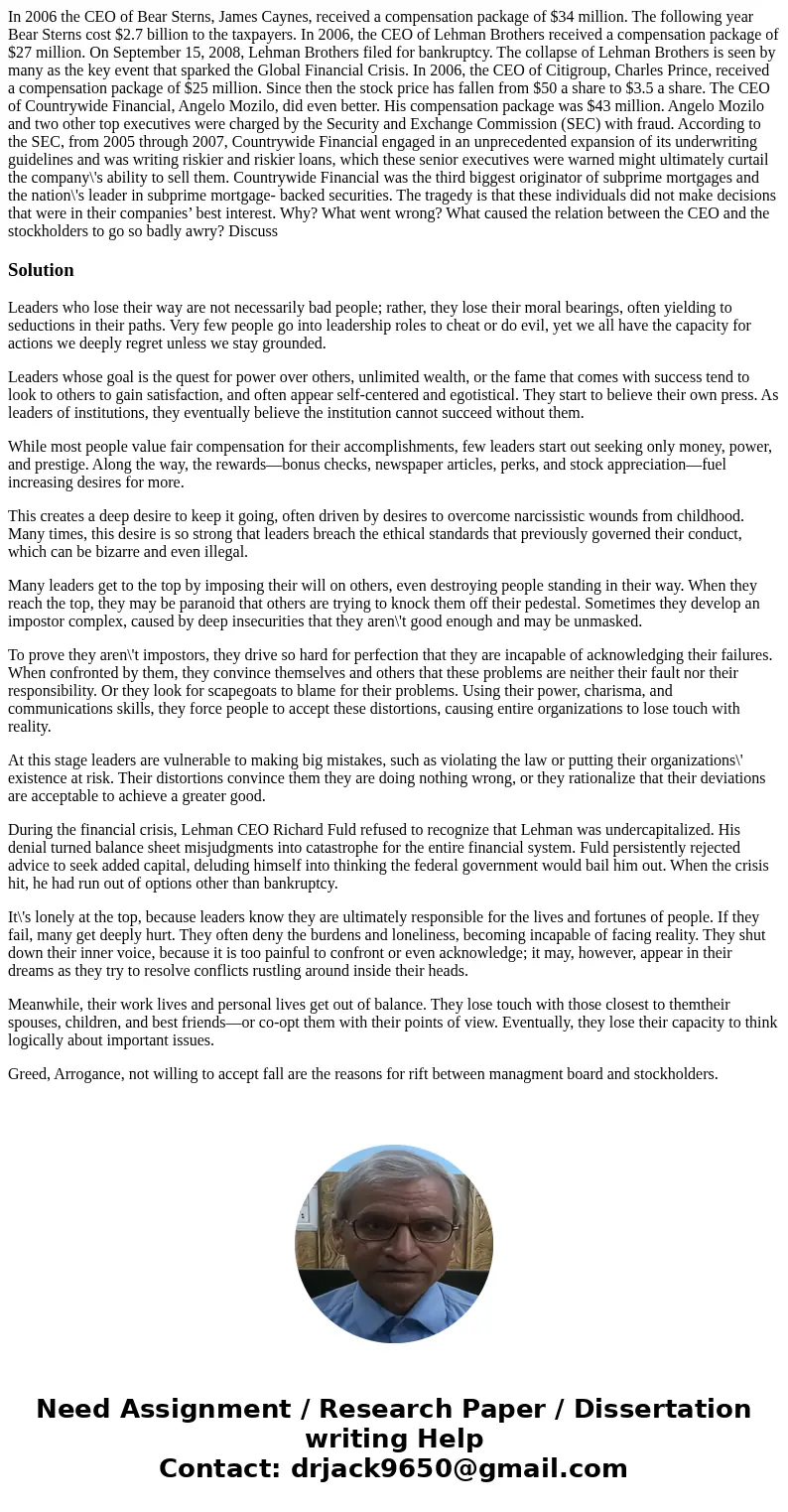In 2006 the CEO of Bear Sterns James Caynes received a compe
In 2006 the CEO of Bear Sterns, James Caynes, received a compensation package of $34 million. The following year Bear Sterns cost $2.7 billion to the taxpayers. In 2006, the CEO of Lehman Brothers received a compensation package of $27 million. On September 15, 2008, Lehman Brothers filed for bankruptcy. The collapse of Lehman Brothers is seen by many as the key event that sparked the Global Financial Crisis. In 2006, the CEO of Citigroup, Charles Prince, received a compensation package of $25 million. Since then the stock price has fallen from $50 a share to $3.5 a share. The CEO of Countrywide Financial, Angelo Mozilo, did even better. His compensation package was $43 million. Angelo Mozilo and two other top executives were charged by the Security and Exchange Commission (SEC) with fraud. According to the SEC, from 2005 through 2007, Countrywide Financial engaged in an unprecedented expansion of its underwriting guidelines and was writing riskier and riskier loans, which these senior executives were warned might ultimately curtail the company\'s ability to sell them. Countrywide Financial was the third biggest originator of subprime mortgages and the nation\'s leader in subprime mortgage- backed securities. The tragedy is that these individuals did not make decisions that were in their companies’ best interest. Why? What went wrong? What caused the relation between the CEO and the stockholders to go so badly awry? Discuss
Solution
Leaders who lose their way are not necessarily bad people; rather, they lose their moral bearings, often yielding to seductions in their paths. Very few people go into leadership roles to cheat or do evil, yet we all have the capacity for actions we deeply regret unless we stay grounded.
Leaders whose goal is the quest for power over others, unlimited wealth, or the fame that comes with success tend to look to others to gain satisfaction, and often appear self-centered and egotistical. They start to believe their own press. As leaders of institutions, they eventually believe the institution cannot succeed without them.
While most people value fair compensation for their accomplishments, few leaders start out seeking only money, power, and prestige. Along the way, the rewards—bonus checks, newspaper articles, perks, and stock appreciation—fuel increasing desires for more.
This creates a deep desire to keep it going, often driven by desires to overcome narcissistic wounds from childhood. Many times, this desire is so strong that leaders breach the ethical standards that previously governed their conduct, which can be bizarre and even illegal.
Many leaders get to the top by imposing their will on others, even destroying people standing in their way. When they reach the top, they may be paranoid that others are trying to knock them off their pedestal. Sometimes they develop an impostor complex, caused by deep insecurities that they aren\'t good enough and may be unmasked.
To prove they aren\'t impostors, they drive so hard for perfection that they are incapable of acknowledging their failures. When confronted by them, they convince themselves and others that these problems are neither their fault nor their responsibility. Or they look for scapegoats to blame for their problems. Using their power, charisma, and communications skills, they force people to accept these distortions, causing entire organizations to lose touch with reality.
At this stage leaders are vulnerable to making big mistakes, such as violating the law or putting their organizations\' existence at risk. Their distortions convince them they are doing nothing wrong, or they rationalize that their deviations are acceptable to achieve a greater good.
During the financial crisis, Lehman CEO Richard Fuld refused to recognize that Lehman was undercapitalized. His denial turned balance sheet misjudgments into catastrophe for the entire financial system. Fuld persistently rejected advice to seek added capital, deluding himself into thinking the federal government would bail him out. When the crisis hit, he had run out of options other than bankruptcy.
It\'s lonely at the top, because leaders know they are ultimately responsible for the lives and fortunes of people. If they fail, many get deeply hurt. They often deny the burdens and loneliness, becoming incapable of facing reality. They shut down their inner voice, because it is too painful to confront or even acknowledge; it may, however, appear in their dreams as they try to resolve conflicts rustling around inside their heads.
Meanwhile, their work lives and personal lives get out of balance. They lose touch with those closest to themtheir spouses, children, and best friends—or co-opt them with their points of view. Eventually, they lose their capacity to think logically about important issues.
Greed, Arrogance, not willing to accept fall are the reasons for rift between managment board and stockholders.

 Homework Sourse
Homework Sourse